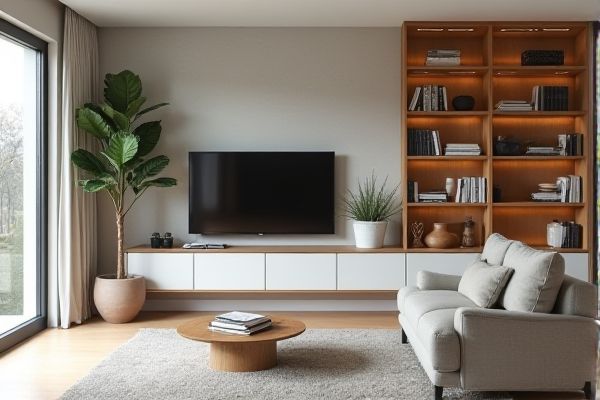
Modular shelving offers customizable, flexible storage solutions that adapt to changing needs, while fixed shelving provides sturdy, permanent frameworks ideal for consistent use. Discover which option suits your space and lifestyle best by exploring the rest of this article.
Table of Comparison
| Feature | Modular Shelving | Fixed Shelving |
|---|---|---|
| Flexibility | Highly customizable; easy to reconfigure or expand | Permanent layout; fixed design limits changes |
| Installation | Quick and simple assembly without structural changes | Requires professional installation; structural modifications possible |
| Cost | Higher initial cost but cost-effective long term due to adaptability | Lower upfront cost; less adaptable leads to potential future expenses |
| Durability | Strong materials but may be less robust than fixed options | Generally more sturdy and durable over time |
| Design | Modern, versatile designs fit various spaces and needs | Traditional designs; limited style variations |
| Usage | Best for dynamic spaces needing frequent adjustments | Ideal for permanent storage solutions |
Introduction to Modular and Fixed Shelving
Modular shelving offers customizable, adjustable components designed to fit varied storage needs, enhancing flexibility in space management. Fixed shelving features permanently installed units that provide sturdy, reliable storage with a consistent structure. Choosing between modular and fixed shelving impacts your organization strategy, balancing adaptability with durability.
Key Differences Between Modular and Fixed Shelving
Modular shelving offers customizable, adjustable components that allow you to easily reconfigure or expand storage based on changing needs, while fixed shelving provides a permanent, sturdy structure designed for specific dimensions and weight capacities. Modular systems typically feature lightweight materials and versatile brackets, enabling quick assembly and relocation, contrasting with fixed shelving's robust build intended for long-term, heavy-duty use in a designated space. Understanding these key differences helps optimize your storage solutions for flexibility, durability, and efficiency depending on your environment and usage requirements.
Design Flexibility and Customization
Modular shelving offers unparalleled design flexibility with adjustable components that can be easily reconfigured to fit your changing storage needs and space constraints. Fixed shelving provides a more permanent and sturdy solution but lacks the adaptability to accommodate evolving design preferences or layout modifications. Choosing modular shelving empowers you to customize the arrangement and dimensions, optimizing functionality and aesthetics in any environment.
Installation Process and Requirements
Modular shelving offers a flexible installation process requiring minimal tools and adaptable components that fit various spaces, making it ideal for both DIY enthusiasts and professionals. Fixed shelving demands precise measurements and wall reinforcements during installation to ensure stability, often requiring professional expertise. Modular systems typically allow for quick reconfiguration without damaging walls, whereas fixed shelves involve a more permanent setup with anchors or studs.
Space Optimization and Layout Efficiency
Modular shelving offers superior space optimization by allowing adjustable heights and customizable configurations to fit various room dimensions and storage needs. Fixed shelving, though sturdy, limits layout efficiency due to predetermined spacing and fixed installation, often leading to underutilized vertical or horizontal space. Businesses and homeowners seeking flexible storage solutions benefit from modular systems that maximize capacity and adapt to changing requirements over time.
Durability and Material Options
Modular shelving offers versatile material options such as metal, wood, and plastic, allowing customization to suit various durability needs and environments. Fixed shelving typically uses heavier-duty materials like solid wood or steel, providing enhanced strength and long-term stability for heavy loads. Durability in modular units depends on assembly quality and material choice, while fixed shelving is generally more robust and resistant to wear over time.
Cost Comparison: Modular vs Fixed Shelving
Modular shelving generally offers lower upfront costs compared to fixed shelving due to its flexible design and ease of installation, reducing labor expenses significantly. Fixed shelving requires higher initial investment in materials and professional installation, but offers long-term structural stability, which may reduce replacement frequency. The total cost of ownership for modular shelving is often lower in dynamic environments needing frequent reconfiguration, whereas fixed shelving may be more cost-effective for permanent, heavy-duty storage solutions.
Maintenance and Upkeep Considerations
Modular shelving systems offer easier maintenance and upkeep due to their customizable components, allowing damaged parts to be replaced individually without disrupting the entire structure. Fixed shelving often requires more extensive repairs because components are permanently attached, leading to higher costs and longer downtime during maintenance. Regular inspections and cleaning are essential for both types, but modular shelving minimizes labor and material expenses by enabling quick adjustments and upgrades.
Best Applications for Modular Shelving
Modular shelving offers unparalleled flexibility, making it ideal for spaces that require frequent reorganization or expansion, such as retail stores, offices, and warehouses. Its customizable components allow you to adjust shelf height and configuration to accommodate varying item sizes and storage needs efficiently. This adaptability makes modular shelving the best choice for dynamic environments where storage demands change frequently.
Ideal Uses for Fixed Shelving
Fixed shelving is ideal for heavy-duty storage needs such as industrial warehouses, libraries, and retail stockrooms where stability and long-term durability are essential. You benefit from its robust structure to hold large quantities of heavy items without risk of sagging or collapse. Fixed shelving systems are perfect for locations with consistent spacing requirements and where shelf adjustments are rarely needed.
 homyna.com
homyna.com